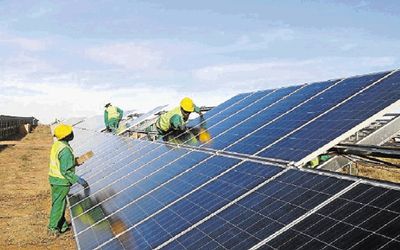SA’s targets for the global climate change negotiations in December were unlikely to succeed because the country was going in the wrong direction with the construction of huge fossil-fuel power stations, Parliament’s environmental affairs committee was told on Tuesday.
A Department of Environmental Affairs delegation led by director-general Nosipho Ngcaba said at the public hearings that the negotiations under the United Nations’ Framework Convention on Climate Change were set to finalise a new legal instrument for the regulation of greenhouse gas emissions. SA was on track to achieve the 2% target.
SA is expected to play a leading role at the Conference of Parties 21 (COP21) as a constructive actor on behalf of the developing world.
Member states at COP21 will state their positions through what are known as intended national determined contributions, in which they indicate what they intend to achieve.
But environmental activists argued that SA was failing to hold two of its biggest polluters — Eskom and Sasol — to account.
Tristan Taylor of Earthlife Africa said: "SA is on the wrong trajectory with the upward emissions that will result from the building of Medupi and Kusile power stations."
He added that a "hard look" needed to be taken at the use of coal if the 2% target were to be met.
Louise Naude, of the World Wildlife Fund, said SA should be investing its hard-earned tax money differently and "not in going in the wrong direction" with fossil fuels.
Her colleague, Tasneem Essop, said the South African intended national determined contributions were weak.
"We urge SA to take strong positions," she said.
Penny-Jane Cooke, of Greenpeace Africa, said SA should contribute its fair share in achieving reductions, and needed to make a fundamental change away from fossil fuel.
The young and thriving renewable energy sector should be championed by the government, she said.
Ms Cooke said there were not enough details in SA’s intended national determined contributions.
She also dismissed nuclear energy as the solution to the global change targets, saying that building nuclear power stations and disposing of the waste were highly carbon intensive.
Hameda Deedat of the Congress of South African Trade Unions’ research arm also took aim at the nuclear plan.
This plan did not create jobs, while renewable energy plants did, she said.
Ms Deedat warned that global warming would have a devastating effect on employment.

Workers assemble the Kalkbult solar energy plant in the Karoo. Picture: SUNDAY TIMES
SA’s targets for the global climate change negotiations in December were unlikely to succeed because the country was going in the wrong direction with the construction of huge fossil-fuel power stations, Parliament’s environmental affairs committee was told on Tuesday.
A Department of Environmental Affairs delegation led by director-general Nosipho Ngcaba said at the public hearings that the negotiations under the United Nations’ Framework Convention on Climate Change were set to finalise a new legal instrument for the regulation of greenhouse gas emissions. SA was on track to achieve the 2% target.
SA is expected to play a leading role at the Conference of Parties 21 (COP21) as a constructive actor on behalf of the developing world.
Member states at COP21 will state their positions through what are known as intended national determined contributions, in which they indicate what they intend to achieve.
But environmental activists argued that SA was failing to hold two of its biggest polluters — Eskom and Sasol — to account.
Tristan Taylor of Earthlife Africa said: "SA is on the wrong trajectory with the upward emissions that will result from the building of Medupi and Kusile power stations."
He added that a "hard look" needed to be taken at the use of coal if the 2% target were to be met.
Louise Naude, of the World Wildlife Fund, said SA should be investing its hard-earned tax money differently and "not in going in the wrong direction" with fossil fuels.
Her colleague, Tasneem Essop, said the South African intended national determined contributions were weak.
"We urge SA to take strong positions," she said.
Penny-Jane Cooke, of Greenpeace Africa, said SA should contribute its fair share in achieving reductions, and needed to make a fundamental change away from fossil fuel.
The young and thriving renewable energy sector should be championed by the government, she said.
Ms Cooke said there were not enough details in SA’s intended national determined contributions.
She also dismissed nuclear energy as the solution to the global change targets, saying that building nuclear power stations and disposing of the waste were highly carbon intensive.
Hameda Deedat of the Congress of South African Trade Unions’ research arm also took aim at the nuclear plan.
This plan did not create jobs, while renewable energy plants did, she said.
Ms Deedat warned that global warming would have a devastating effect on employment.




















